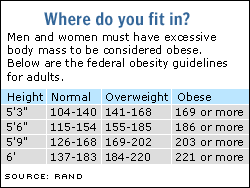
NEW YORK (CNN/Money) -
Dieters may want to lose weight to look more attractive. But experts say there's another reason to shed pounds: Obesity costs money -- a lot of it.
Obesity now kills 300,000 Americans per year and health-care costs associated with the disease top $100 billion annually. The World Bank has estimated that 12 percent of the U.S. national health-care budget is spent treating obesity.
There are other costs as well. One study found that businesses lose $47.6 billion annually due to the indirect costs of obesity, such as lost productivity and higher absenteeism among excessively overweight workers.
A growing problem
Defined by federal guidelines, obesity is determined by a person's so-called body-mass index (BMI) -- a complex calculation, but one that essentially boils down to height and weight. A BMI score of 30 or more is classified as obese, and a reading of 25 to 29.9 is overweight. A person who is 6 feet tall would be classified as obese if he or she weighed 221 pounds or more (see table for more guidelines).
The standard BMI categories do not differentiate between male and female adults and do not factor for such variables as body frames. People are often surprised by where they fall on the BMI chart (and not pleasantly), and some people may be misclassified. Nevertheless, the BMI formula is a reasonably good guideline, according to Jackie Viteri, spokesperson at American Obesity Association.

Today, six out of 10 American adults -- some 120 million -- are overweight or obese, according to the National Institutes of Health. Roughly 24 percent of adults are obese -- more than double the amount a decade ago. One in five children qualifies.
Despite Americans' obsession with weight and the popularity of fad diets, the sheer cost of obesity -- and its epidemic sweep over the country -- has gone largely unnoticed, health experts say. As a result, there's been inadequate efforts to help Americans trim down.
In fact, obesity now causes more health problems than smoking, heavy drinking, or poverty, according to Rand Corporation. Obese individuals spend 36 percent more on health care, and 21 percent more on medication, than daily smokers and heavy drinkers.
"Being obese is like aging from 30 to 50," said Roldand Sturm, a health economist at the Rand Corporation who authored the obesity study. "People say, 'how could we miss this?' The truth is they didn't. Smoking used to be the big deal in the 1960s and obesity levels stayed level. It's really just exploded in the last 10 years."
Even Sturm was caught off-guard.
"My gut feeling when I started the study was that obesity was pretty bad but it would not beat smoking and drinking. But it really does by a substantial margin," he said.
Will the new tax break help?
This week, the IRS announced it would recognize obesity as a disease, and has ruled that obese individuals can deduct the cost of doctor-prescribed weight-loss programs.
| |
 MORE TAX ARTICLES
MORE TAX ARTICLES
| |
| | |
| | |
|
Previously, weight-loss expenses have not qualified for a deduction if a person's weight did not contribute to other illnesses. Since 2000, weight-loss program costs could be deducted if the program was prescribed to treat other diseases such as hypertension, diabetes or heart disease.
The new rule recognizes that obesity is a disease in its own right, thus making it easier for individuals to write off their out-of-pocket expenses.
"The ruling should help a considerable number of people," Viteri.
Maybe. But, for several reasons, it won't have an immediate impact in the war on fat.
- Any weight-loss program must be prescribed by a physician. The cost of special diet foods can't be included since individuals have to pay for their food whether they're losing weight or not.
- Medical costs can be deducted only if they exceed 7.5 percent of a person's adjusted gross income. This strict requirement keeps most Americans from claiming medical deductions. According to the IRS, only 4 percent of filers deduct their medical costs. For more information about various medical costs that may qualify for a deduction see IRS Publication 502.
- Finally, it is far from given that insurance companies will begin covering weight-loss treatments. "What tends to drive coverage is good science about the effectiveness of particular treatments," said Susan Pisano, spokesperson at American Association of Health Plans. "When we get information that suggests that particular approaches are effective in treating obesity, when there's proof they work, then those services will be covered," she said.
That attitude draws fire from people like Linda Carilli, general manager of public affairs at Weight Watchers. "Quitting smoking is tough. And look what we've done to reduce smoking in this country. First, we started out with a warning from the Surgeon General. Then we had anti-smoking ads on TV, then people had to smoke outside. Who smokes now? A lot fewer people," Carilli said. "To say that it's impossible to treat obesity is not thinking very far ahead."

|

